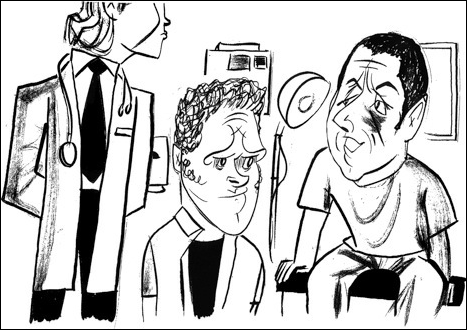Funny People “is leisurely, with many extended sequences, but the performers’ natural command of rhythm holds it in tension,” writes New Yorker critic David Denby in a review dated 8.3. The hilarious dialogues among the three roommates are like complicated, interlocked sparring matches.

“The scenes between Adam Sandler and Seth Rogen are more conventionally dramatic, but George’s shifting moods make them unstable and nerve-racking. Apatow is not only generous to performers here; he’s generous to himself, too, creating the kind of visual divertissements he has never attempted before — most memorably, a mock George Simmons family film, Re-Do, with Sandler’s grownup face digitally joined to the body of an infant.
“George talks on the phone, complains, shouts. He literally returns to diapers — the comic’s inner infant never dies. But when [he] tries to act as a grownup in life, things don’t go as well. He has a vision of the happiness he lost — a relationship with a live-wire actress, Laura (Leslie Mann), twelve years earlier. He cheated on her, and they never married, but, his disease in remission, he tries to get something going with her again, even though she’s now living in Northern California with her two daughters (the actual children of Apatow and Leslie Mann) and her fierce Australian husband (Eric Bana).
“Like an errant meteor, George crashes into a functioning family. The last third of em>Funny People is a further development of the question that em>Knocked Up/em> asked: What does it take to be a husband? Apatow, who probably understands the obsessive loneliness of comics as well as anyone, also knows a thing or two about family life. The miracle of Funny People is that it brings these two entirely dissimilar, even antagonistic worlds into a single, resonant whole.












